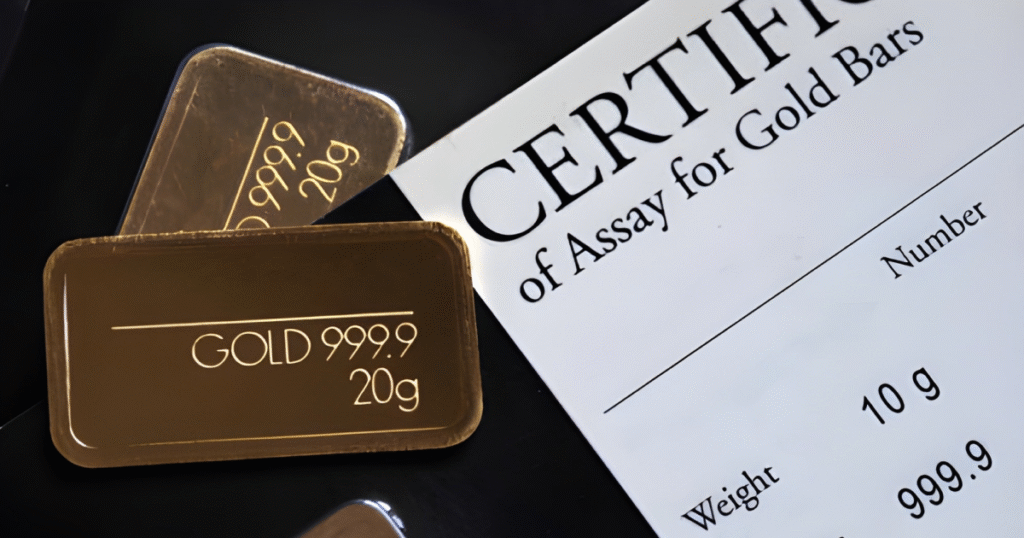How to Choose a Trusted Gold Buyer: 5 Non-Negotiable Factors for a Safe and Transparent Transaction

Selling gold, whether it’s old jewelry or bullion, involves a significant amount of money and trust. To ensure you get the best value and avoid scams, you must select a reputable buyer. Here are five non-negotiable factors you must evaluate before making a deal:
1. Transparency in the Valuation Process
A trustworthy gold buyer will perform all tests and weight measurements right in front of you, without exception. This process must be entirely transparent.
The Testing Method: The buyer must clearly explain how they are testing the gold’s purity (karat value). Common methods include the use of electronic gold testers or the traditional touchstone and acid test. You should be able to see the results.
Accurate Weighing: The digital weighing scale must be certified and calibrated by a government weights and measures authority. Look for a seal or sticker indicating its certification. The scale should be clearly visible to you and reset to zero before your gold is placed on it.
Deductions and Impurities: The buyer should explicitly state the percentage of weight they deduct for impurities (like stones, lacquer, dirt, or soldering material). This “melting loss” or “wastage” should be clearly justifiable and not an arbitrary high number.
2. Fair and Live Market Pricing
The value of your gold is directly tied to the highly volatile international gold market. A reliable buyer links their purchasing price to this live rate.
Spot Price Link: The final rate offered should be based on the current daily market price (spot price) for your gold’s purity (e.g., 22 Karat or 18 Karat). Ask to see the live feed or a recognized industry benchmark.
The Calculation Formula: They must provide a clear, easy-to-understand calculation that looks something like this:
Total Price=(Net Weight)×(Purity Percentage)×(Live Market Rate per gram)Avoid Fixed Rates: Be wary of buyers offering a flat, fixed price without referencing the live market. This usually indicates they are using a deliberately low price to maximize their profit margin.
3. Clear Payment Options and Immediate Settlement
A safe transaction requires clear, immediate, and traceable payment. You should never be asked to wait for your money or accept vague payment promises.
Multiple Options: A professional buyer offers various secure payment methods, including Bank Transfer (NEFT/IMPS/RTGS), Cheque, or Digital Wallet transfers.
Instant Payment: Payment should be processed immediately upon final agreement. Bank transfers are generally the safest option as they create a clear digital trail.
No Hidden Fees: The quoted price should be the final amount you receive. Ensure there are absolutely no hidden processing fees, transaction costs, or late penalties deducted from the final amount.
4. Strong Reputation and Operational History
The buyer’s track record and public image are powerful indicators of trustworthiness.
Physical Presence and Licenses: Choose buyers who operate from a professional, established physical office or store, not just a temporary or mobile setup. They should possess the necessary trade licenses and government registrations.
Customer Reviews and Feedback: Check online reviews (Google, Yelp, etc.) and customer forums. Look for consistent complaints regarding low pricing, misleading testing, or deduction discrepancies. A long history of positive, consistent reviews is a strong vote of confidence.
Industry Recognition: Reputable buyers often have affiliations or certifications from local trade bodies or jewelers’ associations.
5. Documentation and Paperwork
A transparent transaction is always backed up by proper legal documentation. This protects both you and the buyer.
Detailed Invoice/Receipt: You must receive a printed and signed Invoice or Receipt detailing the transaction. This document should explicitly state:
Your name and contact details.
The buyer’s details.
The itemized list of jewelry/bullion sold.
The gross weight, net weight, purity level (Karat), and the agreed-upon price per gram.
The final payout amount and payment method used.
Proof of Identity: Expect to provide a valid ID (like an Aadhar Card or PAN Card) for KYC (Know Your Customer) purposes. This is a sign of a legally compliant operation.
By strictly adhering to these five factors, you significantly reduce the risk of being underpaid or dealing with an unreliable party, ensuring your gold transaction is both safe and maximally profitable.






